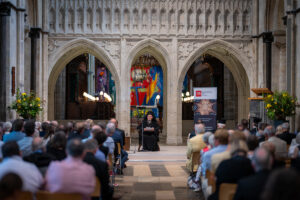The U.S. State Department has classified Iran as a “country of particular concern” for “having engaged in or tolerated particularly severe violations of religious freedom.”
For previous ChristianPersecution.com coverage of Iran, see here.
“‘We were so scared that at night we held each other’s hands and prayed,’” Article 18, March 8, 2022:
For Atena Fooladi Helabad, the stress of her arrest and detention was so great that it brought on her period.
The Christian convert, who was 28 years old at the time, said she had “listened to so many news reports about what happened to political prisoners that in those moments when I was alone, I imagined some male agents may enter my cell and rape me.
“I was very scared, so I started to pray,” says Atena, whose birth name was Samira. “And because of the stress, suddenly my period began.
“There were no female officers there. I knocked on the cell door and a few minutes later a male officer came. Embarrassed, I asked him for a sanitary pad.”
Atena spent 12 days in detention following her arrest in February 2013, for the first five days of which she was held in the notorious “Alef Ta” ward of Isfahan’s Dastgerd Prison.
Her description above relates to her very first moments in the prison, after being handed a chador (head-to-toe Islamic dress) and placed in a solitary cell, in which she was held for around four hours.
“I think they adjusted the temperature of the cell themselves,” Atena recalls, “because it kept decreasing and got colder and colder so that it became unbearable.”
Later on, Atena was transferred to another cell in which two of her Christian friends were also being held.
Charges were brought against 14 members of Atena’s house-church in all, including two of her four sisters.
The charges were: “propaganda against the holy regime of the Islamic Republic of Iran”, “membership of groups opposed to the Islamic Republic of Iran”, “forming a group and recruiting members – in coordination with foreign organisations – to propagate evangelical and Zionist Christianity”, “forming house-churches, organising meetings and providing illegal books and literature, with the aim of attracting more members in order to oppose the holy regime of the Islamic Republic of Iran”, and “inappropriate relationships [because unrelated members of the opposite sex had gathered together, and the women weren’t wearing headscarves]”.
Atena says she was interrogated eight or nine times during her detention – always late at night “when our minds were very tired and we couldn’t think well” – and that “if we answered their questions in a short or tactful way, they would hurl insults at us and tear up our answer sheets so we would have to write everything again”.
Atena’s interrogators also told her they would arrest her parents and two youngest siblings, and stop them from being able to continue their studies at university.
After one interrogation, Atena and her sister Sara were taken to two extremely cold solitary cells as a punishment for not answering as desired.
But even in the shared cells, Atena says the women were made to feel “very uncomfortable”.
“The toilet and shower in the cell were in one section, and the wall which separated them from the rest of the cell wasn’t very high, and there was no door,” she explains. “Since there was a camera in the cell, and the officers could watch us, we were very uncomfortable going to the toilet or taking a shower, and two of us would hold a chador in front of that area when the other person went to the bathroom.”…







